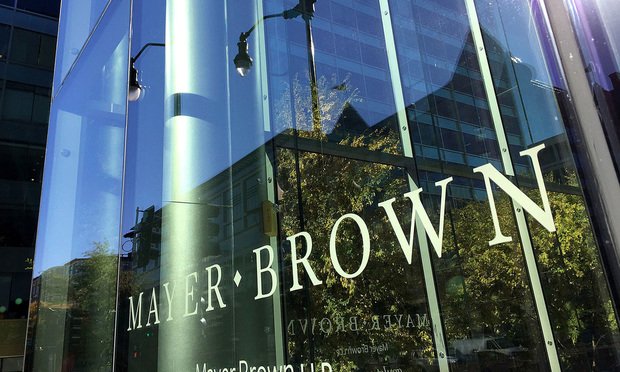Supreme Court Advocates Push Back on 'Harmful' Proposed Word Limits
“Brief writers would often have to sacrifice readability and clarity to meet the word limit,” according to a letter 18 firms sent to the U.S. Supreme Court on Friday.
November 30, 2018 at 02:52 PM
4 minute read
 Mayer Brown offices in Washington DC. Credit: Diego M. Radzinschi/ NLJ
Mayer Brown offices in Washington DC. Credit: Diego M. Radzinschi/ NLJ
A coalition of 18 law firms that specialize in Supreme Court advocacy told the court Friday that proposed rules aimed at trimming the length of briefs “would be harmful” to lawyers' ability to “thoroughly and thoughtfully brief issues that are critical to the court's resolution of the cases before it.”
The firms' letter to Supreme Court Clerk Scott Harris added that “a high percentage of the Court's merits cases are of great national importance and therefore warrant comprehensive briefing.”
The firms that joined in the effort, organized by Michael Kimberly of Mayer Brown, were: Akin Gump Strauss Hauer & Feld; MoloLamken; Arnold & Porter Kaye Scholer; Morrison & Foerster; Bursch Law; O'Melveny & Myers; Gibson, Dunn & Crutcher; Quinn, Emanuel, Urquhart & Sullivan; Gupta Wessler; Ropes & Gray; Jenner & Block; Sidley Austin; Kellogg, Hansen, Todd, Figel & Frederick; Vinson & Elkins; Wilmer Cutler Pickering Hale and Dorr; King & Spalding; Winston & Strawn; and Mayer Brown.
The proposed rules changes, promulgated in early November, called for cutting the word limit of briefs on the merits from 15,000 to 13,000 words. The firms' letter said that in “average” cases, that reduction might be doable, but added, “It can be challenging in cases of even moderate complexity to recite the relevant facts, argue the issues raised, and include all required parts of the brief within the currently allotted 15,000 words.”
The letter continued, “Brief writers would often have to sacrifice readability and clarity to meet the word limit,” and that could result encouraging parties to “outsource important arguments to their supporting amici. This would give an unfair advantage to more experienced practitioners before the court; it would also unhelpfully shift focus from the parties' briefs to non-party amicus briefs.”
But from the moment the proposed changes were made public, the most unpopular was the one trimming reply briefs—briefs filed by the appellant after the appellee and its amici have filed briefs—from 6,000 words to 4,500. “Reply briefs are a tight squeeze even now,” John Elwood, a Vinson & Elkins partner, said at the time.
The firms' letter said such a cut is “cause for concern.” Shrinking “the already restrictive 6,000 word limit by an additional 25 percent … would mean that many significant arguments will necessarily go unaddressed, substantially reducing the reply's utility.”
The firms also commented on the court's proposal that amicus briefs be trimmed from 9,000 to 8,000 words, suggesting that “if reducing overall briefing is desirable, we submit that the court should further reduce the word limit for amicus briefs rather than reduce the word limit for party briefs. After all, if the court's workload has increased since it last adjusted the word limits, that is in large part a result of the proliferation of amicus briefs.”
The letter the firms sent to the Supreme Court is posted below:
Read more:
SCOTUS Advocates Grumble at Proposed Rules to Shorten Filings
Ted Boutrous, CNN's Champion, Is Fired Up
Roberts Talks Kavanaugh, the Court's Shrinking Docket and 'Legally Blonde'
Tips for Supreme Court Advocates | Verrilli: Rule of Law Is 'Under Threat'
Kagan Says Repeat Players at SCOTUS 'Know What It Is We Like'
This content has been archived. It is available through our partners, LexisNexis® and Bloomberg Law.
To view this content, please continue to their sites.
Not a Lexis Subscriber?
Subscribe Now
Not a Bloomberg Law Subscriber?
Subscribe Now
NOT FOR REPRINT
© 2025 ALM Global, LLC, All Rights Reserved. Request academic re-use from www.copyright.com. All other uses, submit a request to [email protected]. For more information visit Asset & Logo Licensing.
You Might Like
View All
Is 1st Circuit the New Center for Trump Policy Challenges?

Insurance Policies Don’t Cover Home Depot's Data Breach Costs, 6th Circuit Says

'Religious Discrimination'?: 4th Circuit Revives Challenge to Employer Vaccine Mandate
2 minute read
Standing Spat: Split 2nd Circuit Lets Challenge to Pfizer Diversity Program Proceed
Trending Stories
- 1Avantia Publicly Announces Agentic AI Platform Ava
- 2Shifting Sands: May a Court Properly Order the Sale of the Marital Residence During a Divorce’s Pendency?
- 3Joint Custody Awards in New York – The Current Rule
- 4Paul Hastings, Recruiting From Davis Polk, Continues Finance Practice Build
- 5Chancery: Common Stock Worthless in 'Jacobson v. Akademos' and Transaction Was Entirely Fair
Who Got The Work
J. Brugh Lower of Gibbons has entered an appearance for industrial equipment supplier Devco Corporation in a pending trademark infringement lawsuit. The suit, accusing the defendant of selling knock-off Graco products, was filed Dec. 18 in New Jersey District Court by Rivkin Radler on behalf of Graco Inc. and Graco Minnesota. The case, assigned to U.S. District Judge Zahid N. Quraishi, is 3:24-cv-11294, Graco Inc. et al v. Devco Corporation.
Who Got The Work
Rebecca Maller-Stein and Kent A. Yalowitz of Arnold & Porter Kaye Scholer have entered their appearances for Hanaco Venture Capital and its executives, Lior Prosor and David Frankel, in a pending securities lawsuit. The action, filed on Dec. 24 in New York Southern District Court by Zell, Aron & Co. on behalf of Goldeneye Advisors, accuses the defendants of negligently and fraudulently managing the plaintiff's $1 million investment. The case, assigned to U.S. District Judge Vernon S. Broderick, is 1:24-cv-09918, Goldeneye Advisors, LLC v. Hanaco Venture Capital, Ltd. et al.
Who Got The Work
Attorneys from A&O Shearman has stepped in as defense counsel for Toronto-Dominion Bank and other defendants in a pending securities class action. The suit, filed Dec. 11 in New York Southern District Court by Bleichmar Fonti & Auld, accuses the defendants of concealing the bank's 'pervasive' deficiencies in regards to its compliance with the Bank Secrecy Act and the quality of its anti-money laundering controls. The case, assigned to U.S. District Judge Arun Subramanian, is 1:24-cv-09445, Gonzalez v. The Toronto-Dominion Bank et al.
Who Got The Work
Crown Castle International, a Pennsylvania company providing shared communications infrastructure, has turned to Luke D. Wolf of Gordon Rees Scully Mansukhani to fend off a pending breach-of-contract lawsuit. The court action, filed Nov. 25 in Michigan Eastern District Court by Hooper Hathaway PC on behalf of The Town Residences LLC, accuses Crown Castle of failing to transfer approximately $30,000 in utility payments from T-Mobile in breach of a roof-top lease and assignment agreement. The case, assigned to U.S. District Judge Susan K. Declercq, is 2:24-cv-13131, The Town Residences LLC v. T-Mobile US, Inc. et al.
Who Got The Work
Wilfred P. Coronato and Daniel M. Schwartz of McCarter & English have stepped in as defense counsel to Electrolux Home Products Inc. in a pending product liability lawsuit. The court action, filed Nov. 26 in New York Eastern District Court by Poulos Lopiccolo PC and Nagel Rice LLP on behalf of David Stern, alleges that the defendant's refrigerators’ drawers and shelving repeatedly break and fall apart within months after purchase. The case, assigned to U.S. District Judge Joan M. Azrack, is 2:24-cv-08204, Stern v. Electrolux Home Products, Inc.
Featured Firms
Law Offices of Gary Martin Hays & Associates, P.C.
(470) 294-1674
Law Offices of Mark E. Salomone
(857) 444-6468
Smith & Hassler
(713) 739-1250










